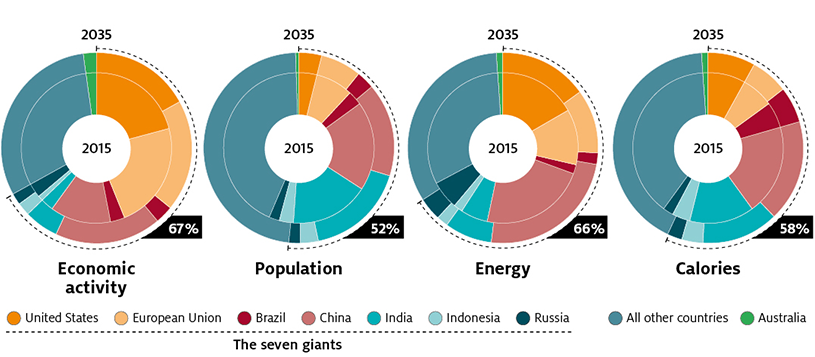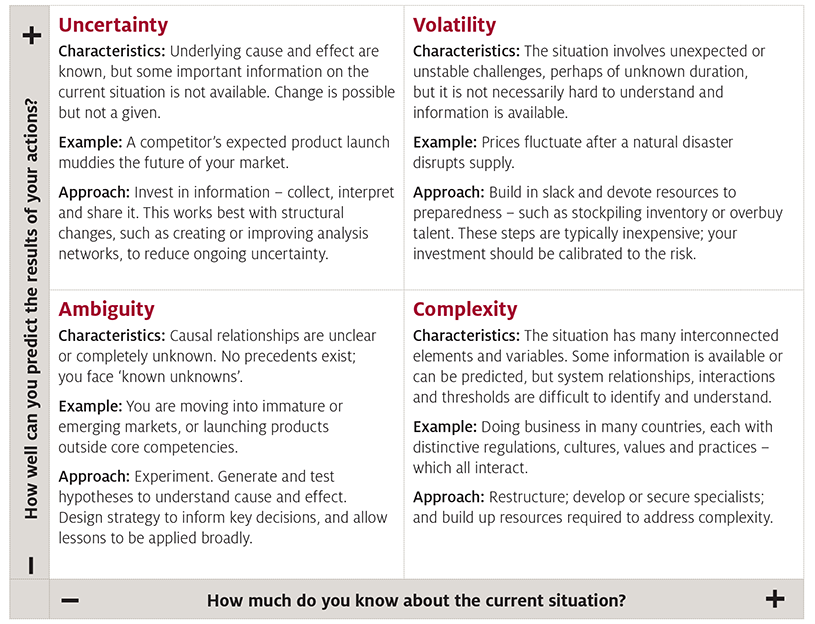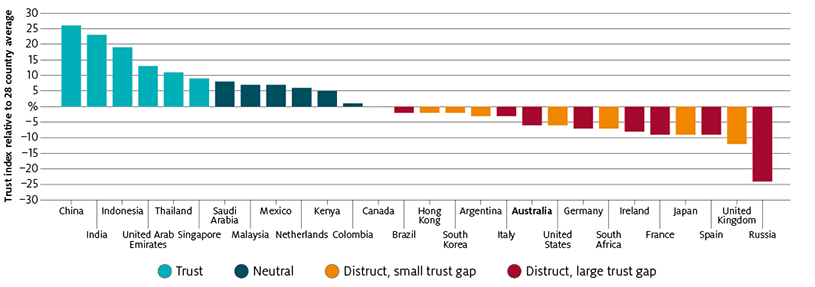
Deep shifts in economic, military and cultural power will continue to reshape the world, as the rise of multiple global powers erodes previous certainties, notwithstanding increasing global integration.
International trade and relations – along with food and fibre markets, supply chains and relationships – will all become more complex as nations assert their sovereignty, often in pursuit of populist appeal rather than mutual economic gains.
[expand all]
Seven giants will pursue their individual interests
Geopolitics over coming decades will increasingly reflect the ‘dance of giants’, with seven nations or regions together accounting for between half and two-thirds of global population, economic activity, energy, food production, and resource extractions (see Figure 4). Each of these nations or regions is a great power in its own right, and each will tend to look first to their own internal imperatives and narrative – and give less attention to the norms and institutions of the rules-based international order, which are particularly important to international trade.
The shift from a bi-polar world (split between East and West) to a more fluid multi-polar world risks more complex and unstable geopolitics and economics, making international cooperation both more difficult and more important.
Notes: Figure shows share of global population, economic activity (GDP) at market exchange rates, final energy supply, and food production in calories in 2015 (inner circle) and projected for 2035 (outer circle). Percentages labels are shown for total share for the seven giants in 2035. The seven giants account for 68-70% of global resource extractions (not shown) over the period from 2015 to 2035. Data for EU excludes the UK and includes Iceland, Liechtenstein, Norway and Switzerland.
Data Source: Population, GDP, energy and resource extractions from unpublished data for the Existing Trends scenario, IRP (2019), calories for an equivalent scenario from extended data from Beach et al. (2019), see Robinson et al. (2015).

Volatility, uncertainty, complexity and ambiguity require improved cooperation, but make it more difficult
Volatility, uncertainty, complexity and ambiguity are all likely to become more pronounced in future, relative to recent decades (see Figure 5 for definitions and potential responses). These trends reflect multiple drivers, including shifts in economic activity and power (Seven giants will pursue their individual interests, above), lower income growth and increasing inequality in many regions, increasing environmental pressures (Science suggests major challenges ahead and Interactions and feedbacks often amplify risks), and disruptive technologies (Information-rich production systems will provide new levels of control, and accountability). And the impacts and implications of this trend will occur across multiple domains – including international relations, domestic politics and policy making, business planning, and operational management of farms and businesses.
One implication is that cooperation across different groups is likely to become more difficult, both globally and nationally. But the same challenges will increase the benefits of cooperation, and help motivate actors to find ways to work together and learn from each other across enterprises, sectors and countries.
The Australian bushfire season in late 2019 and early 2020 demonstrates the cascading challenges that can occur when systems face new stresses and circumstances, while the rapid emergence and spread of COVID-19 illustrates both the multiple challenges created by national and global events, and the potential to evolve new approaches and solutions in the face of deep uncertainty, complexity and ambiguity.
Declining trust in evidence and institutions could amplify threats and weaken cooperation
Declining respect for – and trust in – science, evidence, and institutions is likely to exacerbate the impacts of this more fluid national and international context. This decline in public trust in institutions (including government, business, and the media) is associated with a shift towards people relying on sources of information that are aligned with their pre-existing views.
Special interests (including state actors in some cases) will also increase their efforts to undermine informed debate by manufacturing doubt and spreading falsehoods, leveraging technology and human nature for political and economic advantage.
These trends increase the risk that public debate will become more polarised, combative and vulnerable to misinformation. Without open-minded discussion, this will make it more difficult to build consensus and support for how nations and communities might best to respond to social and economic challenges.
The diversity of global experiences with COVID-19 illustrates the both the opportunity to foster bipartisan support for evidence-based approaches by government and business, and the risk that political and cultural divides can undermine consensus and effective action – with potentially disastrous consequences (see Kahan and other authors, Resources and further reading below).
Data source: Edelman Trust Barometer 2020, Global Report, page
Resources and further reading
Coral Bell’s (2015) Living with Giants introduces the global dance of giants, primarily from a security perspective, and the associated geopolitical shift from ‘balance of power’ to a more dynamic ‘concert of powers’, before exploring five potential disruptive global scenarios.
Three Harvard Business Review articles explore how to manage and respond to volatility, uncertainty, complexity and ambiguity. Bennett and Lemoine (2014) outline a framework for understanding each element of VUCA, while Berinato (2014) and Martin (2014) explore implications – including the different roles of strategy and planning.
Dan Kahan (2010) provides a quick introduction to ‘cultural cognition’ – that on complicated and contested topics, people tend to agree with and remember facts and findings that are aligned with the values of their tribe, and which do not have uncomfortable implications for people and groups they care about. This human trait is often leveraged by interest groups to shape debates and influence political outcomes, as illustrated by Oreskes and Conway (2010) and Farrell (2016). Kahan and Braman (2006) set out key causes and dynamics of cultural cognition in more detail. Amanda Ripley (2018) provides guidance on promoting open minded conversations on contested issues by complicating – rather than simplifying – the narrative.

References
Key implications for agriculture
- Realising the potential benefits of increasing global trade volumes for Australian agricultural exporters will require effective market access and effort to discourage protectionist policies (which generally disadvantage consumers in those countries). While external shocks may become more frequent, and global volatility is likely to increase, export orientated sectors will experience lower overall volatility than sectors who are primarily focused on serving domestic markets (given the variability of Australian conditions).
- Australian exporters will face increased risks around market access and consumer attitudes in importing nations, including cross-sector effects where concerns in other areas impact on food and fibre markets. This will increase the ‘option value’ of having access to and relationships with multiple destination markets, reducing the adverse impacts of disruptions to demand from specific countries or market segments.
- Australia’s reputation for supplying healthy, high-quality, ethical and sustainable products is likely to become more important, but cannot be taken for granted (see Reducing net emissions and protecting natural assets could benefit landholders). The most effective responses will establish trusted information platforms, engage authentically with consumer concerns, acknowledge and address poor practices, and provide evidence of improvements over time.



